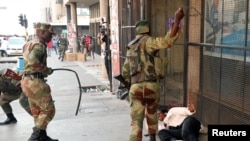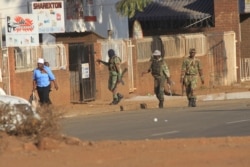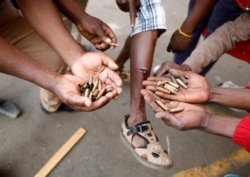The U.S. has questioned the Zimbabwean government’s failure to implement recommendations of the Kgalame Motlanthe Commission, which conducted an inquiry into the gunning down of several people in Harare soon after the 2018 general elections.
In separate tweets, the U.S. Embassy Harare noted that three years have passed following the killing of unarmed Zimbabweans by state security agents but no action has been taken by the government to implement recommendations of the Commission.
“Today marks 3 years since the Motlanthe Commission issued its report calling for Zimbabwe’s government to hold its security forces responsible for killing & injuring civilians for exercising their right to demonstrate. When will there be accountability?”
In other tweets, the U.S. Embassy Harare noted that “Twenty years ago today, the U.S. Congress passed the Zimbabwe Democracy and Economic Recovery Act (ZDERA).
“ZDERA remains the foundation of U.S. policy toward Zimbabwe until the law’s reform provisions are met. ZDERA calls for the Government of Zimbabwe to: 1) restore rule of law; 2) hold free and fair elections; 3) commit to equitable and transparent land reform; and 4) subordinate military and national police to civilian government.”
The Zimbabwean government has indicated recently that it won’t implement any electoral reforms because the country has enough statues to care for national polls.
The Motlanthe Commission said in its final report that an elite brigade of the Zimbabwe Defence Force killed innocent civillians in Harare and as a result there is need to reform the country’s electoral process.
Justice Minister Ziyambi Ziyambi recently told the state-controlled Sunday Mail newspaper that the government has fully complied with recommendations of the Motlanthe Commission, which conducted hearings following the gunning down of six Zimbabweans by state security agents in 2018.
Ziyambi said the government is yet to address some electoral issues as per the Commission’s recommendations.
The Commission recommended the compensation for losses and damages caused, including in particular, support and school fees for the children of the deceased; promotion of political tolerance, and responsible and accountable leadership and citizenry, electoral reforms including the development of Information Communication Technology (ICT), to among other things, enhance the transparent and expeditious announcement of election results; the enforcement of law and order in order to ensure that the events of the 1st of August 2018 are not repeated; accountability in respect of the alleged perpetrators; and nation building and reconciliation including an initiative for multi-party dialogue and cooperation.
The Commission established that the demonstrations were incited, pre-planned and well-organised by the MDC Alliance; the particular circumstances prevailing on the day justified the deployment of the military to assist the police in containing the riots; and six people died and 35 were injured as a result of actions by the military and the police.
Some opposition supporters engaged in street protest in August 2018 demanding the immediate release of presidential elections results.
Relatives of people, who were gunned down by state security agents in 2018 before the announcement of presidential election results, are pressing the Zimbabwean government to compensate them, more than three years they were killed by an elite brigade in Harare.
In an interview, some of the relatives said they were told by government officials that the Ministry of Public Service, Labor and Social Welfare would take care of their needs.
One of the affected people, Alison Charles, whose brother, Gavin Dean Charles, was gunned down, said indications are that the family won’t be compensated for his death.
Alison said, “We would like the government to compensate us. We want closure. We would like to know who shot my brother. Who killed him. You know, as a family we have been checking and all we know is we buried somebody that we love. We have no word from anybody, nobody even apologized to us for taking his life.”
Some affected families also expressed the same sentiments, saying the government is not forthcoming with any kind of help.







